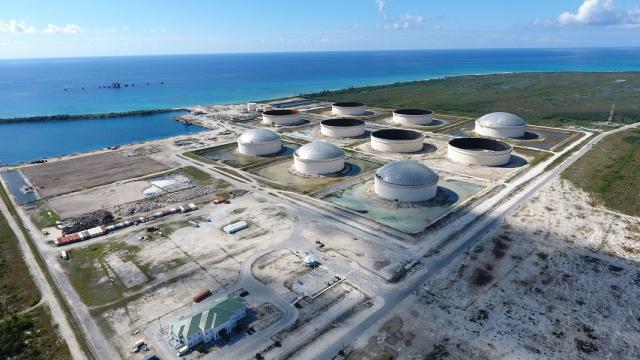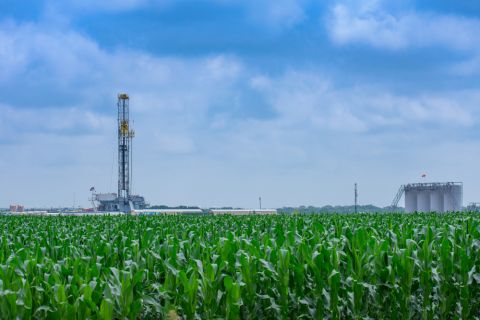
Liwathon Group said the terminal, being bought from Equinor for an undisclosed sum, will have a phased launch in 2023 as part of a $100 million relaunch. (Courtesy of Equinor)
Equinor has entered into an agreement to sell its South Riding Point oil terminal at the Grand Bahama Island in the Bahamas to Estonia’s Liwathon Group. Financial terms were not disclosed by either company and Equinor said further commercial details on the transaction would not be forthcoming.
Liwathon Group said the terminal will have a phased launch in 2023 as part of a $100 million relaunch. Liwathon will assume the responsibilities for the employees of South Riding Point, Equinor said, adding that Bahamian authorities had approved the transaction.
Equinor bought the terminal in 2009 to enable the company to trade oil primarily originating from American markets. The terminal was commissioned in 1973 and has a total storage capacity of 6.8 MMbbl.
In September 2019, the South Riding Point terminal was in the direct path of Dorian, a violent Category 5 hurricane, sustaining extensive damages including an oil spill which affected the terminal site and a forest area north-east of the terminal. Equinor reported in 2019 regulatory filings that an onshore spill of 8,744 cubic meters (roughly 55,000 bbl) resulted. The company also reported an impairment of $176 million in related damage.
Since then, extensive clean-up operations have been performed by Equinor in close collaboration with Bahamian authorities. The clean-up operations outside the fence were concluded in March 2021, and extensive testing of the groundwater outside the terminal has shown no sign of hydrocarbon deposits.
“Since we bought the South Riding Point terminal in 2009, the flow in the oil market in North America has changed significantly for Equinor, and the company has increasingly sold crude to other regions globally,” Alex Grant, Equinor’s senior vice president for crude, products and liquids, said in a Feb. 21 press release. “Consequently, we believe a new owner would be better positioned for the further development of the terminal.”
“This transaction supports our strategy to focus and concentrate the portfolio around core areas and allows us to redeploy capital where we believe we have a stronger competitive advantage,” Grant said. “Liwathon will now take over ownership and commence a process to restart regular operations of the South Riding Point terminal.”
Liwathon said in a separate news release it will rename the facility Liwathon B.O.S. LLC. Liwathon B.O.S. said the facility comprises 10 large storage tanks. It includes a Sea Island that facilitates the safe berthing of different sized oil tankers up to VLCC. The terminal offers the group and its customers opportunities for storage and transshipment from Latin America and North America.
Liwathon Group is an integrated logistics and investment business. The company currently operates four facilities in Estonia with a storage capacity of over one million cubic meters. The company provides an extensive range of services in the area of handling, transport and storage of liquid fuels traded globally.
Recommended Reading
NextEra Energy Dials Up Solar as Power Demand Grows
2024-04-23 - NextEra’s renewable energy arm added about 2,765 megawatts to its backlog in first-quarter 2024, marking its second-best quarter for renewables — and the best for solar and storage origination.
Halliburton’s Low-key M&A Strategy Remains Unchanged
2024-04-23 - Halliburton CEO Jeff Miller says expected organic growth generates more shareholder value than following consolidation trends, such as chief rival SLB’s plans to buy ChampionX.
Enverus: 1Q Upstream Deals Hit $51B, but Consolidation is Slowing
2024-04-23 - Oil and gas dealmaking continued at a high clip in the first quarter, especially in the Permian Basin. But a thinning list of potential takeout targets, and an invigorated Federal Trade Commission, are chilling the red-hot M&A market.
Baker Hughes Awarded Saudi Pipeline Technology Contract
2024-04-23 - Baker Hughes will supply centrifugal compressors for Saudi Arabia’s new pipeline system, which aims to increase gas distribution across the kingdom and reduce carbon emissions
Ithaca Energy to Buy Eni's UK Assets in $938MM North Sea Deal
2024-04-23 - Eni, one of Italy's biggest energy companies, will transfer its U.K. business in exchange for 38.5% of Ithaca's share capital, while the existing Ithaca Energy shareholders will own the remaining 61.5% of the combined group.




